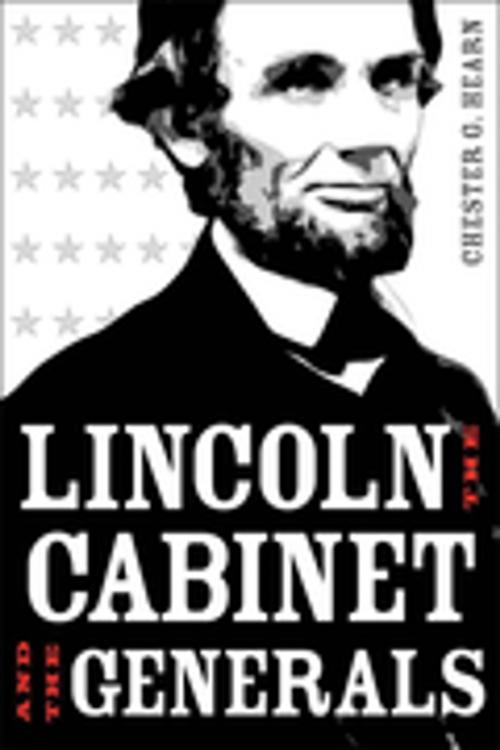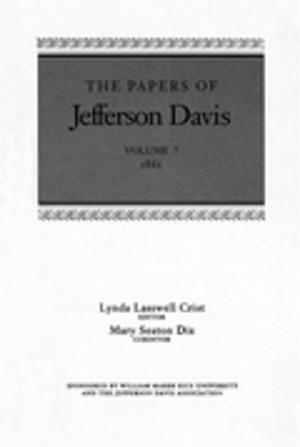Lincoln, the Cabinet, and the Generals
Nonfiction, History, Americas, United States, Civil War Period (1850-1877)| Author: | Chester G. Hearn | ISBN: | 9780807146514 |
| Publisher: | LSU Press | Publication: | April 1, 2010 |
| Imprint: | LSU Press | Language: | English |
| Author: | Chester G. Hearn |
| ISBN: | 9780807146514 |
| Publisher: | LSU Press |
| Publication: | April 1, 2010 |
| Imprint: | LSU Press |
| Language: | English |
While numerous accounts exist of President Abraham Lincoln's often-troubled dealings with either his cabinet or his generals, Chester G. Hearn's illuminating history provides the first broad synthesis of Lincoln's complex relationship with both groups. As such, it casts new light on much of the behind-the-scenes interplay, intrigue, and sparring between the president and his advisors and military commanders during the most precarious years of the Civil War.
Turning first to Lincoln's cabinet, Hearn explains that Lincoln exercised a unique decision-making process: he reached a firm conclusion on an issue, but then he debated it endlessly with his cabinet or generals as if still undecided. To ensure the liveliest discourse, Lincoln appointed as his advisors men with widely differing political motivations. The Republican Lincoln spent four years attempting to bring together his cabinet of former Whigs and Democrats in the spirit of cooperation, but he never completely achieved his purpose. Hearn explores the president's relationship with this cabinet, the problems he encountered selecting it, and the difficulties he experienced attempting to maintain ideological balance while trying to maneuver around those who disagreed with him.
Lincoln never broached a subject that did not create some level of dissent within the cabinet, and differences in political philosophy and personal rivalries led to great debate over the running of the administration, the selection of generals, foreign relations and military mobilization, emancipation, freedom of the press, civil rights, and other issues. Still, Hearn asserts, Lincoln's ability to navigate internal scuffles and external turmoil helped to define his presidency.
Hearn next demonstrates convincingly that even with these difficulties, Lincoln manipulated his cabinet far more adroitly than he did his generals. Many of Lincoln's top military commanders had political aspirations or agendas of their own, while others were close friends of his intransigent cabinet members. Having assumed the role as de facto army chief, Lincoln took responsibility for the mishandling of battles fought by his generals, some of whom were incompetent and unmanageable politicians. Hearn examines the often-disastrous generalship and its impact on Lincoln and the cabinet, as well as the public, the press, and Congress.
Based on over a decade of research, Lincoln, the Cabinet, and the Generals offers both a fresh perspective on and a new interpretation of Lincoln's presidency -- one that reveals the leadership genius as well as the imperfections of America's sixteenth president.
While numerous accounts exist of President Abraham Lincoln's often-troubled dealings with either his cabinet or his generals, Chester G. Hearn's illuminating history provides the first broad synthesis of Lincoln's complex relationship with both groups. As such, it casts new light on much of the behind-the-scenes interplay, intrigue, and sparring between the president and his advisors and military commanders during the most precarious years of the Civil War.
Turning first to Lincoln's cabinet, Hearn explains that Lincoln exercised a unique decision-making process: he reached a firm conclusion on an issue, but then he debated it endlessly with his cabinet or generals as if still undecided. To ensure the liveliest discourse, Lincoln appointed as his advisors men with widely differing political motivations. The Republican Lincoln spent four years attempting to bring together his cabinet of former Whigs and Democrats in the spirit of cooperation, but he never completely achieved his purpose. Hearn explores the president's relationship with this cabinet, the problems he encountered selecting it, and the difficulties he experienced attempting to maintain ideological balance while trying to maneuver around those who disagreed with him.
Lincoln never broached a subject that did not create some level of dissent within the cabinet, and differences in political philosophy and personal rivalries led to great debate over the running of the administration, the selection of generals, foreign relations and military mobilization, emancipation, freedom of the press, civil rights, and other issues. Still, Hearn asserts, Lincoln's ability to navigate internal scuffles and external turmoil helped to define his presidency.
Hearn next demonstrates convincingly that even with these difficulties, Lincoln manipulated his cabinet far more adroitly than he did his generals. Many of Lincoln's top military commanders had political aspirations or agendas of their own, while others were close friends of his intransigent cabinet members. Having assumed the role as de facto army chief, Lincoln took responsibility for the mishandling of battles fought by his generals, some of whom were incompetent and unmanageable politicians. Hearn examines the often-disastrous generalship and its impact on Lincoln and the cabinet, as well as the public, the press, and Congress.
Based on over a decade of research, Lincoln, the Cabinet, and the Generals offers both a fresh perspective on and a new interpretation of Lincoln's presidency -- one that reveals the leadership genius as well as the imperfections of America's sixteenth president.















